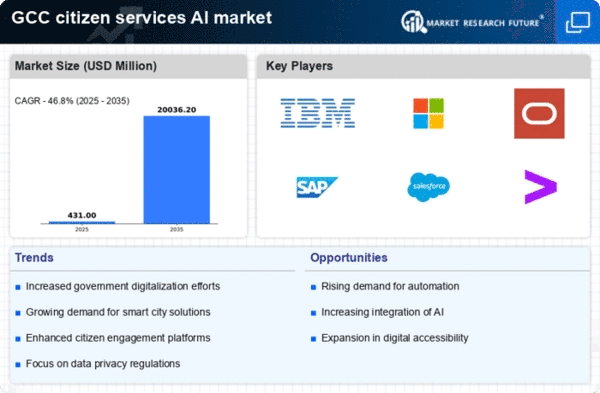Collaboration with Private Sector
Collaboration between public entities and the private sector is emerging as a significant driver in the citizen services-ai market. Partnerships with technology firms enable governments to access cutting-edge AI solutions and expertise, facilitating the rapid deployment of innovative services. This trend is evident in various pilot projects across the GCC, where public-private partnerships have resulted in enhanced service delivery and improved citizen engagement. Such collaborations are expected to grow, with estimates suggesting that they could account for up to 40% of AI investments in the public sector by 2026. This synergy is likely to foster a more dynamic and responsive citizen services-ai market.
Integration of Smart Technologies
The integration of smart technologies into public services is a key driver for the citizen services-ai market. As cities in the GCC evolve into smart cities, the demand for AI solutions that facilitate real-time data processing and decision-making is increasing. Technologies such as IoT and machine learning are being utilized to optimize resource allocation and improve service delivery. This trend is reflected in the growing number of smart city projects, with investments projected to reach $100 billion by 2030 in the region. The synergy between AI and smart technologies is likely to enhance the capabilities of public services, thereby expanding the market.
Focus on Data Privacy and Security
As the citizen services-ai market expands, concerns regarding data privacy and security are becoming increasingly prominent. Governments in the GCC are prioritizing the establishment of robust frameworks to protect citizen data while implementing AI solutions. This focus on security is essential to build trust among citizens and encourage the adoption of AI-driven services. Regulatory measures are being developed to ensure compliance with international standards, which may lead to increased operational costs for service providers. However, the emphasis on data protection is likely to create a more secure environment for AI applications, ultimately benefiting the market.
Government Initiatives and Investments
In the GCC, various government initiatives are driving the growth of the citizen services-ai market. National strategies aimed at digital transformation are allocating substantial budgets to integrate AI into public services. For example, the UAE's Vision 2021 emphasizes the importance of smart government services, which has resulted in investments exceeding $1 billion in AI technologies. Such initiatives not only enhance service efficiency but also foster innovation within the public sector. The commitment of governments to leverage AI solutions is expected to propel the market forward, potentially leading to a market size of $2 billion by 2027.
Rising Demand for Efficient Public Services
The citizen services AI market is experiencing a notable surge in demand for efficient public services across the GCC. Governments are increasingly pressured to enhance service delivery while managing limited resources. This has led to the adoption of AI technologies that streamline operations, reduce response times, and improve overall citizen satisfaction. For instance, the implementation of AI-driven chatbots in public service departments has shown to decrease operational costs by up to 30%. As citizens expect faster and more reliable services, the market is likely to expand, with projections indicating a growth rate of approximately 15% annually in the coming years.
















